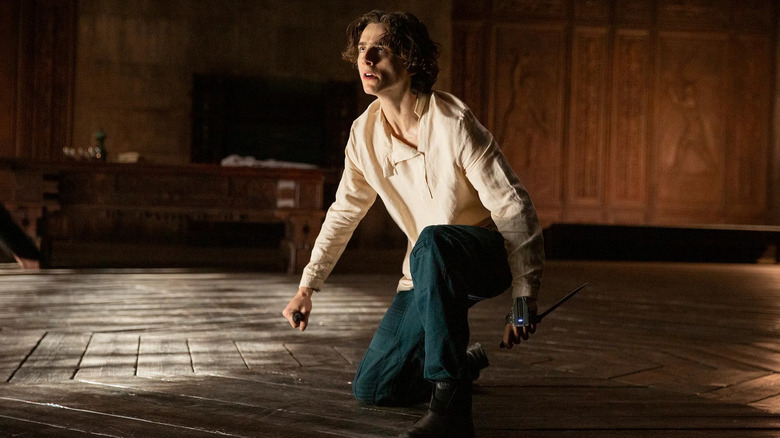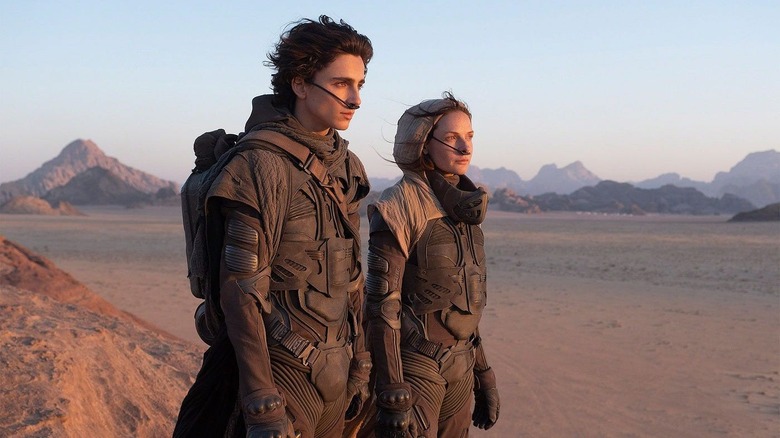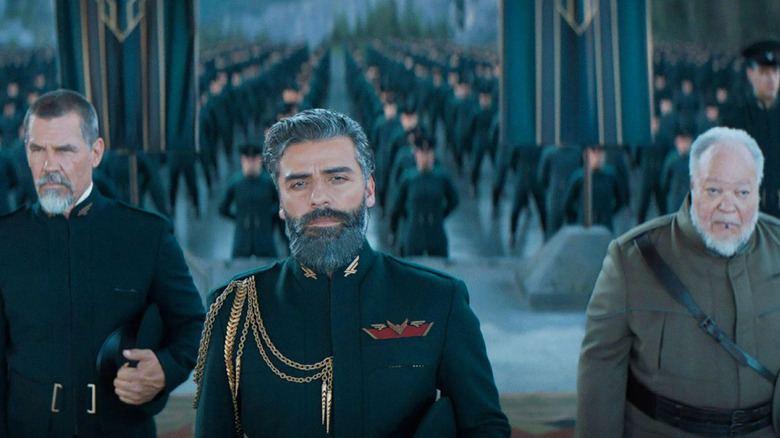Denis Villeneuve Still Grapples With Dune's Forced Streaming Release
The theatrical-only release of "Dune: Part Two" back in March of 2024 was an unequivocal success, both at the box office and within the cultural conversation. Even though the film is now available for digital rental and purchase (with a physical media release coming on May 14, 2024), it's still playing in movie theaters and is still being talked about, debated over, and memed (the latter being the biggest bellwether for a piece of media's impact in pop culture these days).
As the old saying goes, failure is an orphan while success has many fathers. Did "Dune: Part Two" succeed solely on its own merits? Was it helped by a robust press tour, along with a buzzworthy, unintentionally raunchy popcorn bucket tie-in? Was it the fanbase of the "Dune" franchise that helped boost its popularity? Or — and this is the most pertinent question — had audiences been primed for the next chapter thanks to 2021's "Dune: Part One?"
If the answer to that last question is "Yes," and why wouldn't it be, then another, more troubling question naturally follows. "Dune: Part One's" release was not without controversy, being one of Warner Bros. Discovery's films to be released that year simultaneously in theaters and on the HBO Max streaming platform. The hard question is whether "Part One" was hampered by this release strategy, as so many films on WB's slate that year were, or whether the increased access to the film during the first year after the worst of the COVID-19 pandemic helped build word of mouth, thereby creating further awareness and excitement for "Part Two."
As far as the director of both films, Denis Villeneuve, is concerned, the forced streaming release of "Part One" did more harm than good for the movie. However, even he acknowledges that the situation surrounding the release was complex and that a movie seen initially in an inferior presentation like streaming doesn't necessarily mean it's been ruined for the viewer.
Villeneuve appreciates streaming, but believes films need theatrical space first
As the streaming bubble continues to burst, more people are coming to realize what a grift the business model is and has been; everything from folks involved with the films and television released on streamers not being paid properly to the works themselves disappearing forever from services at the whim of the rights holders demonstrates how unsustainable streaming is in its current configuration.
Of course, much of the brouhaha surrounding streaming has been about the way it's fully permeated people's viewing habits and experiential expectations, especially as an alternative (or full-on preference) to theaters, which have their own issues these days, too. In a piece written for Vanity Fair in 2022, Villeneuve affirms that watching a movie for the first time on streaming isn't inherently bad, as it is akin to how he (and others of a certain age like myself) first experienced a number of classic films:
"Growing up in that remote village, I saw some movies on big screens, but the theaters were far from home. So as a young kid, I saw '2001: A Space Odyssey' for the first time on TV. The same with the first 'Planet of the Apes' and the original 'Blade Runner' too. Discovering cinema on TV meant that I was watching movies that were terrible copies—washed out, oversaturated, distorted. When I finally saw the masterpieces in a theater, they had a far greater impact."
Villeneuve goes on to say that "Dune" was always intended for cinemas, and that despite its accessibility, streaming is "still a shrinking of something meant to be overwhelming and immersive." Given the way that Netflix (and other streamers following their lead) has programmed their viewers to treat their offerings like something to occasionally pay attention to while it's on in the background, Villeneuve has a point. As he succinctly puts it:
"But movies dreamed and made for the big screen need to be born on the big screen. Cinema is an art form that needs an audience."
Cinema is about shared space with other people, continuing a rich human tradition
Of course, it's easy to say that a movie like "Dune," shot for story-sized IMAX screens featuring such grandiose visuals as ships folding space and harvesters running away from giant sandworms and the like, should be primarily seen in theaters first. In general, most people tend to agree that a trip to the movie theater to see a big movie (especially if it's in IMAX) is a worthwhile venture, and the conventional wisdom is that audiences can save their money elsewhere, choosing to wait for the smaller, less spectacular, non-"event" movies to pop up on streaming at home.
However, Villeneuve's thoughts on cinemagoing isn't limited to that line of thinking, as he rightly recognizes the power of the communal experience. As he points out in his piece, even though movie theaters being "a roller coaster" of a business caused Wall Street and executives to think a day-and-date streaming release was a good idea, in the case of "Dune" the real "enemy" was the pandemic. He elaborates:
"It's still difficult for me to process that 'Dune' was released on TV at the same time that it debuted in theaters. We still did good numbers theatrically, but what saved us was that the word of mouth was strong and that people were tired of being at home. We are not meant to be isolated; we are meant to be together. 'Dune' arrived at just the right moment."
The enthusiastic and long-lasting response to "Dune: Part Two" proves Villeneuve's point; not only can a theaters-only release still be financially viable, but it allows the movie itself to have a cultural life much greater and longer than any streaming debut thanks to audience sharing the experience of it. If, for Villeneuve, "Dune" arrived at the right moment, then perhaps "Dune: Part Two" marks another "right moment" for our culture, where folks are either beginning to fall back in love with the cinema or having their long-standing affection reaffirmed. Let's see where we are when "Dune Messiah" comes out.


